#traduttrice
Explore tagged Tumblr posts
Link
Quando traduco dall'inglese all'italiano a volte mi scontro con neologismi finto-inglesi che rendono tutto più complicato. Avete presente il 'baby parking'? TRASCRIZIONE [ENG translation below] Non mi piace fare la spocchiosa, a meno che non mi si chieda espressamente non correggo mai la pronuncia inglese delle persone. Però è inevitabile che essendo laureata in lingue ed avendo vissuto 23 anni in Australia, e avendo lavorato soprattutto in Australia sempre in professioni che richiedevano l'uso della lingua inglese, non posso fare a meno di notare alcune anomalie che diventano un problema quando devo tradurre qualcosa, soprattutto quando devo tradurre un concetto che in italiano viene descritto usando a sproposito un termine inglese. Ora non parlo di quei termini che noi ci siamo inventati e che nella lingua inglese non vengono usati, tipo pullover che noi usiamo per dire maglione, ma che in inglese significa tirare su, oppure il modo in cui noi usiamo la parola mister che in inglese significa semplicemente signore che noi invece usiamo come l'allenatore del calcio, o lo smoking, che in inglese significa semplicemente l'atto di fumare. No, parlo di espressioni che noi abbiamo in qualche modo boh, che ci siamo inventati di sana pianta e che in inglese proprio non vengono usate per niente. Pensate un po' come si usa il body, body in inglese significa corpo, per noi invece è la tutina che si usa per fare attività, attività di ginnastica. Oppure quando noi ci riferiamo a uno spot, se io dico spot tutti pensano lo spot pubblicitario, in inglese spot vuol dire macchia, o addirittura il water, il gabinetto. Water immagino che sia la parola inglese che significa acqua, che viene pronunciata water, però vabbè, ripeto questi sono casi che sono entrati ormai a far parte della lingua italiana, nel bene e nel male, e la lingua è un essere vivente, quindi si evolve. No, oggi mi sono confrontata con la traduzione di childcare, un childcare particolare, sono quei posti dove chi va in piscina a fare ginnastica ecc. lascia il bambino, la bambina per il tempo necessario, qualcuno glielo guarda. Ecco, in italiano questa cosa qua si chiama baby parking, che il parcheggio dei bambini. Io come faccio a tradurre childcare con baby parking? Io non ce la faccio. Io lo so che in Italia si usa, ma è una cosa orribile un parcheggio infantile e i bambini non sono dei pacchi che si parcheggiano, anche perché chi offre questo servizio mette a disposizione personale qualificato. Non va bene, bisogna che ci inventiamo qualcos'altro. Non mi piace il baby parking. Io non lo traduco baby parking, mi rifiuto. TRANSLATION I don't like to be snooty, and unless I'm specifically asked, I never correct people's English pronunciation. However, it is inevitable that having a degree in languages and having lived 23 years in Australia, and having worked in Australia always in professions that required the use of the English language, I cannot help but notice some anomalies that become a problem when I have to translate something, especially when I have to translate a concept that in Italian is described using an English term inappropriately. Now, I'm not talking about those terms that we have made up and that are not used in English, such as pullover that we use to say sweater, but in English means to pull over, or the way in which we use the word mister which in English simply means sir but we instead use is for football coach, or smoking, [tuxedo] which in English simply means the act of smoking. No, I'm talking about expressions that we somehow have IDK, made up from scratch and that in English are not used at all. Think about how to use body [leotard] in English means body, for us instead it is the onesie that is used to do activities, gymnastic activities. Or when we refer to a spot, if I say spot everyone thinks of the commercial, in English spot means stain, or even the toilet bowl, the water, water I guess is the English word that means water, which is pronounced /ˈwoːtə/, but oh well, I repeat these are cases that have now become part of the Italian language, for better or for worse, and the language is a living being, so yes it evolves. No, today I dealt with the translation of childcare, a particular childcare, those places where people going to the pool to do gymnastics etc. leave the child for the necessary time, and someone is taking care of them. Here, in Italian this thing here is called baby parking, which is a parking lot for children. How do I translate childcare with baby parking? I can't do it. I know that it is used in Italy, but it is a horrible thing to park children, children are not packages to be parked, also because those who offer this service make qualified personnel available. It's not good, we need to come up with something else. I don't like baby parking. I won't use baby parking, I refuse.
#3minutigrezzi#babyparking#body#childcare#gabinetto#linguainglese#linguaitaliana#micropodcast#mister#paroleinglesi#podcast#pullover#smoking#spot#traduttrice#traduzioni#treminutigrezzi#water
0 notes
Text
Va bene che devo imparare... ma sto comunque traducendo un testo medico! IO VOGLIO ESSERE PAGATAAAA
3 notes
·
View notes
Text

Questa cosa mi fa ancora sorridere, evidentemente se non sei lucida e parli con un po' troppo entusiasmo di un farmaco usando termini come 'allucinazioni fighissime' quel farmaco viene bannato e ora appare come allergia
Stilnox non ti preoccupare i nostri destini si incroceranno di nuovo un giorno ♡
#all'epoca scrissi un post su tumblr perché ero convinta che fosse scoppiata la terza guerra mondiale#e che i russi mi volessero come traduttrice
3 notes
·
View notes
Text
oddio veramente volevi fare il coiffeur se non facevi il calciatore ti prego vieni a tagliarmi la frangia che ce l'ho un disastro
#.........davvero gli voglio un bene dell'anima lasciatemi stare#tra l'altro su dazn i sottitoli dicono: barbiere#idk are u pressed or. perché mica è solo barbiere#va bene stendiamo un pietoso velo direi.#gliel'ha pure dovuto mimare..........ma posso farla io la traduttrice kjvhgds santocielo
3 notes
·
View notes
Text
Clean - Tabula Rasa di Glenn Cooper: Una corsa contro il tempo per salvare l'umanità. Recensione di Alessandria today
Un thriller distopico che esplora la memoria e la fragilità della civiltà.
Un thriller distopico che esplora la memoria e la fragilità della civiltà. Recensione dettagliata.“Clean – Tabula Rasa”, scritto da Glenn Cooper e tradotto da Barbara Ronca, è un thriller distopico che immagina un mondo sconvolto da un’epidemia globale. Il dottor Steadman, vicino a sconfiggere l’Alzheimer, si ritrova responsabile involontario di un virus che cancella la memoria dell’intera…
#Alessandria today#Barbara Ronca traduttrice#Clean - Tabula Rasa#crisi globale#dottor Jamie Abbott#dottor Steadman#epidemia globale#futuri distopici#Glenn Cooper#Google News#italianewsmedia.com#Lotta per la Sopravvivenza#memoria e identità#narrativa apocalittica#narrativa distopica#narrativa emozionante#narrativa etica#narrativa internazionale#narrativa moderna#narrativa speculativa#Pier Carlo Lava#romanzi Glenn Cooper#romanzi tradotti#romanzo avvincente#romanzo d’avventura#romanzo d’azione.#romanzo di sopravvivenza#romanzo distopico#romanzo internazionale#romanzo sulla memoria
0 notes
Text
Mariana Tudorache. Insieme a lei parliamo di Mihai Eminescu, Ioan Slavici e Florence Macleod Harper. Intervista alla traduttrice
Mariana Tudorache Insieme a lei parliamo di Mihai Eminescu, Ioan Slavici e Florence Macleod Harper Intervista alla traduttrice di Giuseppe Iannozzi Mariana Tudorache ha tradotto tre libri di grande pregio letterario e poetico: “Amando in segreto” di Mihai Eminescu, “Il mulino della fortuna” di Ioan Slavici e “Addio Russia! Una testimone della rivoluzione del 1917” di Florence Macleod Harper.…
#Addio Russia! Una testimone della rivoluzione del 1917#Amando in segreto#Florence Macleod Harper#Giuseppe Iannozzi#Il mulino della fortuna#intervista alla traduttrice#Ioan Slavici#LdM Press#Lorenzo de’ Medici Press#Mariana Tudorache#Mihai Eminescu
0 notes
Text
non io che impazzisco per l’italiacano con cui scrive l’unica anima pia che ha passato tutti gli appunti di letteratura inglese sul gruppo dell’uni
#hai la mia ammirazione per la tua magnanimità#ma i al posto di gli non si può vedere#ed è il problema minore#ma vabbene lo stessoooo#se voglio fare davvero la traduttrice in futuro è tutto allenamento
0 notes
Text
Intervista a Federica Bruniera, traduttrice e nomade digitale
NUOVO ARTICOLO! Oggi ti propongo un nuovo formato che spero possa essere interessante e continuare nel tempo! INTERVISTA A FEDERICA BRUNIERA, TRADUTTRICE E NOMADE DIGITALE! #federicabruniera #nomadismodigitale #traduzione
Ho conosciuto Federica girovagando su Instagram e cominciai a seguirla perché faceva proprio quello che voglio fare io: tradurre e viaggiare. Al Salone del Libro di Torino 2022 ho avuto il piacere di conoscerla di persona e ne sono stata felicissima! Mi sembrava quindi interessante proporle un’intervista sulla sua storia, di traduttrice e viaggiatrice, per far conoscere meglio Federica e il suo…

View On WordPress
#agenzia traduzione tariffe#attraversare le americhe#blog di traduzione#circolo polare artico#climate fresk#climate science#come diventare traduttori#consigli di viaggio#consigli nomadismo digitale#consigli per tradurre#copywriter#copywriting#federica bruniera#ikigai translations#intervista#intervista federica bruniera#intervista traduttrice nomade digitale#lavorare con le traduzioni#lavorare per agenzie di traduzione#lavorare remoto#lavorare viaggiando#lavori remoto#lavoro e vita privata nomade digitale#lisa elli#lisa elli traduttrice errante#nomade digitale#nomade digitale sostenibile#nomadi digitali traduzione#nomadismo digitale#organizzare lavoro e vita
0 notes
Text
Ho ragionato che in italiano sarebbe cacanza anziché vacanza e rido ancora di più.
Per la rubrica "menomale che rileggo": ho scritto più volte in un'email "cacation" anziché "vacation". Rileggendo ho riso tantissimo e li ho corretti tutti.
7 notes
·
View notes
Text
"Senza chiederci
se sia giusto o sbagliato
se la vita futura
se la fama… Tu e io
ci amiamo e ci guardiamo".
(Tanka di Akiko Yosano)

Figura importante della letteratura giapponese del Novecento, Akiko Yosano con le sue opere ha presentato una visione progressista del ruolo delle donne nella società
Scrittrice, saggista, traduttrice e soprattutto poetessa, Akiko Yosano passò tutta la sua vita a difendere i diritti delle donne e lottare per una società in cui le donne potessero essere finanziariamente indipendenti.
Akiko abbracciò con fervore l’idea di emancipazione femminile, con un approccio che era allo stesso tempo audace e sottile: le sue poesie non solo esploravano i temi della femminilità e della maternità, ma sfidavano apertamente le norme sociali e le convenzioni di genere dell’epoca. In un momento in cui molte donne erano confinate a ruoli domestici e sottomesse all’autorità maschile, Akiko si ergeva come una voce ribelle, dichiarando la propria autonomia e indipendenza attraverso la sua arte.
Contraria alle idee nazionaliste e convinta pacifista, oggi viene ricordata (non abbastanza) soprattutto per le oltre 50.000 poesie tanka, un componimento dalla struttura fissa di cinque versi, paragonabile al ben più noto haiku.
5 notes
·
View notes
Text
Basta una parola
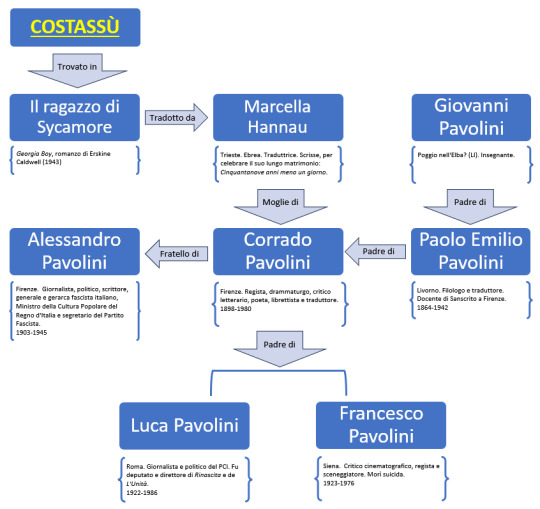
Scriveva Abatelunare, una decina di giorni fa, che spesso leggendo un libro si imparano delle parole nuove, e faceva riferimento a un toscanismo: costassù, trovato in una vecchia versione de Il ragazzo di Sycamore di Erskine Caldwell.
A me occorre poco, appena una parola, per impantanarmi in una serie di percorsi da cui poi faccio fatica a uscire; così è stato anche questa volta.
Infatti, in sintesi:
Da toscano conosco e uso la parola costassù, così come anche gli altri avverbi costì, costà, costaggiù; ricordo bene come, una decina di anni fa, me ne chiese il significato una collega, di madrelingua inglese, da poco arrivata a Siena.
Più di recente, saranno passati tre o quattro anni, durante una lettura condivisa de La vita agra del grossetano Luciano Bianciardi, le due amiche con cui leggevo, una di origine siciliana ma da anni a Napoli, l'altra veneta, mi chiesero lumi su due strane parole in cui si erano imbattute in quel testo: costì e costassù.
Ho chiesto ad Abatelunare chi avesse tradotto il libro, sospettando appunto un toscano, e mi ha indicato Marcella Hannau. Il mio sospetto era ben fondato, anche se non corretto, perchè la Hannau era nata a Trieste ma ha avuto frequentazione lunga e anche intima con la Toscana.
Le ricerche fatte mi hanno portato subito in ambiente fiorentino; la Hannau, traduttrice dall'inglese di oltre una settantina di libri, figlia di uno stakholder della Standard Oil, di famiglia ebraica, sposò molto giovane [nel 1921] Corrado Pavolini, nato a Firenze: regista, drammaturgo, critico letterario, poeta, librettista e traduttore. Corrado era figlio del professor Paolo Emilio, traduttore e docente universitario di Sanscrito, nato a Livorno da padre dell'isola d'Elba. La coppia frequentava l'ambiente culturale italiano del tempo: ci sono ad esempio foto degli anni '30, sulla spiaggia di Castiglioncello, sempre in Toscana (Livorno) in compagnia di Luigi Pirandello, Nicola De Pirro, Marta Abba, Maria Stella Labroca e Silvio D'Amico; le due famiglie, Hannau e Pavolini, frequentavano spiaggia, locali e ville di amici nella zona, già dalla fine degli anni 10 dello scorso secolo.
Corrado Pavolini era il fratello del gerarca fascista Alessandro, Ministro della Cultura Popolare e segretario del Partito Fascista.
Alessandro si rifiutò di aiutare il fratello e la cognata Marcella nel momento della promulgazione delle leggi razziali e Corrado e Marcella scapparono a Cortona (Arezzo) rifugiandosi nella villa dell'amico Debenedetti. A Cortona trovarono un buon nascondiglio anche gli Hannau, i genitori di Marcella, a cui offrì riparo il Vescovo, Monsignor Franciolini, direttamente nella sua abitazione.
Cortona piacque così tanto alla coppia Pavolini-Hannau che fecero della villa "del Bacchino" un loro punto di riferimento a guerra finita e poi, dal 1961, la loro residenza. Ecco come, con tutte queste frequentazioni toscane, la Hannau abbia potuto utilizzare parole ancora in uso nell'italiano del tempo, adesso segnalate dalla Treccani come semplici "toscanismi" vista la loro odierna più ristretta circolazione.
Restano da citare, in questi miei giri intorno alla coppia, due notiziuole "rosa": l'infatuazione per Corrado Pavolini, prima da parte di Anna Maria Ortese, poi di una sua carissima amica, Helle Busacca. [Interessante e rivelatrice questa pagina di Dario Biagi]. Su questo ramo della ricerca mi sono fermato, perché infiniti altri percorsi mi si sono aperti, relativi ai personaggi della cultura italiana dell'epoca e dei loro rapporti di amicizia, rivalità od odio.
Nonostante le ricerche sul web, non sono riuscito a trovare informazioni certe sulle date di nascita e di morte di Marcella Hannau; ho pensato allora di utilizzare il Copilot di Microsoft Bing. L'Inintelligenza Artificiale si è data da fare ma le date che cercavo non me le ha recuperate; in compenso ha tratteggiato un profilo, sintetico ma efficace, del marito Corrado. Peccato, però, che, da brava Inintelligenza, si sia confusa e abbia scritto i dati relativi ad Alessandro Pavolini, il gerarca titolare del MinCulPop e Segretario del Partito Nazionale Fascista, che fu processato per collaborazionismo, fucilato e poi esposto, insieme a Mussolini e alla Petacci, a Piazzale Loreto...
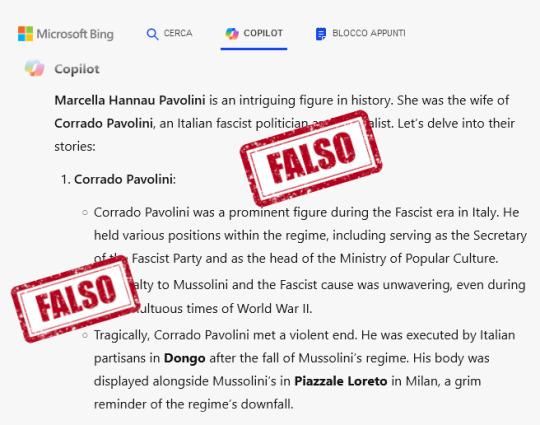
*Aggiornamento del 29/03/2024: Corrado Pavolini e Marcella Hannau riposano ora l'uno accanto all'altra nel piccolo cimitero del Torreone al sommo della collina di Cortona.
18 notes
·
View notes
Text
post lungo!!!!
eccomi finalmente per sfogarmi sui probelmi di questa serie. in realtà uno in particolare, perché vedo che si presenta non solo in un professore o nelle serie italiane, ma spesso e volentieri anche nei media stranieri.
in questa serie, la storia di ogni singolo personaggio femminile ha a che fare con un uomo. le donne vengono sempre associate alle decisioni e ai comportamenti degli uomini nelle loro vite, non sono mai autonome. inoltre, come abbiamo potuto vedere con certi personaggi in particolare (luna e la professoressa di matematica), sono sempre in cerca di attenzione maschile.
luna: personaggio emblematico di questa stagione per quanto riguarda questo tema, fin dalla prima stagione è in cerca di attenzione maschile per sentirsi adeguata. inizialmente il suo personaggio girava attorno alla sua cotta per matteo, poi al fatto di non essere mai stata fidanzata e, infine, alla sua prima relazione con un ragazzo (di cui parlava alle sue amiche mentendo perché apparantemente non pari al classico uomo macho alpha belloccio e non grasso); adesso, invece, disperatamente alla caccia di attenzioni, ha cambiato la propria personalità e si è spogliata di fronte ad un uomo sconosciuto, che si è poi rivelato una persona disgustosa pronta a violentarla insieme ai suoi amici, che non sono stati nemmeno denunciati.
laura: nella prima stagione era semplicemente la fidanzata di simone, che subito si è trasformata nella sua ex che non faceva altro che piangere per lui. a fine stagione è diventata l'interesse amoroso di pin e adesso quello di matteo. ovviamente non ci dimentichiamo di quello che è successo con ernesto. questa è la profondità del personaggio di laura. il nulla.
monica: la sua (tragica) storia? sempre legata ad un uomo, che l'ha svergognata di fronte ai suoi compagni di classe con la tecnica del revenge porn. anche lui non denunciato o punito in alcun modo ovviamente. monica è stata poi anche l'interesse amoroso di giulio e aureliano. pure lei quindi non era indipendente da una figura maschile.
chicca: prima fidanzata, poi ex, poi di nuovo mezza fidanzata e infine ex definitiva di manuel. ha avuto anche una mezza storia con matteo, ma è finita subito. certo, la storia di chicca ha mostrato anche i suoi problemi con la madre e la sua passione per l'arte, ma decisamente questi due elementi hanno avuto un'importanza molto minore rispetto ai primi nella serie.
professoressa di matematica: ne vogliamo parlare? lei è un personaggio che ci fa tornare indietro di 50 anni. è dipinta come la tipica insegnate piacente e sensuale, che si veste scollata e che ama mostrarsi. il suo ruolo nella serie? essere l'ennesima donna con cui dante balestra sfoga le sue pulsioni sessuali. ovviamente ha anche tradito il suo quasi marito e ha deciso di non sposarlo più per timore di avere tendenze da "troia" che non le permetterebbero di essergli fedele (l'ha detto lei eh, ovviamente non con queste parole). in sé, non c'è nulla di male a vestirsi in un certo modo, a vivere la propria sessualità e a decidere di non sposarsi più, ma la maniera in cui tutto ciò è stato scritto e comunicato intende affermare tutt'altro.
cecilia: madre neodivorziata di aureliano e direttrice del museo, è solo l'ennesimo oggetto di divertimento per dante.
anita: essendo uno dei personaggi principali della serie e la madre di manuel, chiaramente la sua storia non gira completamente attorno a degli uomini, ma quasi, sopratutto in questa stagione. nella prima, anita era una traduttrice sempre in cerca di un lavoro poiché aveva problemi economici; il suo personaggio era principalmente questo. poi si imbatte in ettore, che le offre di lavorare nel suo locale sperando in una nuova relazione con lei. e, infine, anche anita cade nelle grinfie di dante, pur se in maniera diversa rispetto alle altre donne. adesso il suo personaggio gira intorno ai problemi che ha con tre uomini diversi: dante, nicola e suo figlio manuel.
nina: anche lei rientra tra quei personaggi femminili più approfonditi grazie alla sua backstory con sua figlia lilli. ma sappiamo tutti che questa sottotrama non sarebbe mai esistita se lo scopo dell'aggiunta di questo personaggio nella serie non fosse stato quello di essere il nuovo interesse amoroso di manuel lmao
viola: anche lei è un personaggio che ha una storia vera, quella della sua disabilità, ma, insieme a nicola, è stata aggiunta alla serie solo per il character development di manuel. e anche lei è l'interesse amoroso di un uomo, rayan.
alice, l'architetta: personaggio incommentabile e disgustoso; una trentenne che ha una breve storia con un ragazzino che va ancora al liceo, manuel.
virginia: su di lei non c'è molto da dire, perché svolge semplicemente il ruolo minore di nonna di simone e madre di dante, che sarebbe stato uguale se fosse stata un uomo (nonno e padre). tranne per il fatto che le hanno dovuto trovare per forza una specie di compagno, qualcuno che le fa la corte, il professor lombardi.
preside: anche lei è un personaggio che svolge un ruolo minore, il quale sarebbe stato interpretato da un uomo alla stessa maniera. peccato che è chiaro che tra lei e dante ci sia stato qualcosa ai tempi dell'università per il rapporto che hanno (è una donna, per forza deve avere una qualche connessione con dante balestra)
floriana: beh che dire, il suo personaggio si esaurisce ad essere la madre di simone e l'ex di dante. solo che ora non è più soltanto una ex lol
dottoressa: non l'avrei inserita in questa lista se non fosse stata rivelata una sua vecchia relazione con dante. ennesima vittima lol
poi se vogliamo aggiungere altro, in questa serie le conversazioni tra amiche (luna, laura, chicca e monica) riguardano sempre relazioni e uomini. queste ragazze sembrano non avere passioni o interessi comuni di cui parlare. nei personaggi maschili, invece, le relazioni sentimentali hanno quasi sempre un'importanza minore. dante prima di tutto è un professore di filosofia con vari problemi, alcuni dei quali riguardano donne, nicola è un padre che recentemente ha scoperto di avere un altro figlio, manuel ha sempre relazioni ma ha anche sempre altro di più importante a cui pensare, mimmo lo stesso (a differenza di nina, lui era anche nella prima stagione ed è stato subito presentato non come un interesse amoroso, ma come un detenuto con vari problemi che viene aiutato da dante), ecc ecc. e simone? in questa seconda stagione il suo unico tratto della personalità è essere gay e pagarne le conseguenze. anche nella prima stagione era così, ma lì il suo personaggio era stato approfondito tanto sotto diversi punti di vista. adesso invece lo hanno appiattito completamente.
e niente raga 👍 ci vediamo stasera lol
#yes i'm a proud dante balestra hater#ovviamente ci sono molte altre cose che si possono dire su questa serie ma per adesso va bene questo#un professore#simone balestra#manuel ferro#mimmo bruni#dante balestra#anita ferro#simuel#mimmone#femminismo#omofobia#cambiate gli autori di questa serie grazie ❤
28 notes
·
View notes
Text
[Chapter 52] Seeing the World Through Ballistic-Tinted Glasses
He was shorter than you would've expected, shorter than any trainer you've had before. Even stood next to Price, he looked nearly half his size. You could easily match his height with a better pair of shoes than your running sneakers. A decent night's sleep made you bright-eyed and eager to learn, a sentiment Price seemed keen to share, catching a glimpse of a confident smile under his moustache. For the time being you were taking in as many visual clues as possible as to who this prescribed instructor was. A tight-fitting moss-coloured tee clung to lean muscles on a slender frame, definitely not a soldier per se, but unquestionably some kind of martial arts instructor. Roughly your age, with deeply rooted smile lines etched into his cheeks.
"Sergeant Grant, this is Lorenzo. Lorenzo, Sergeant Grant. You'll be spending the next few weeks together," Price's voice boomed over the tile toward you.
"It's a pleasure to meet you, sergeant," Lorenzo spoke in a thick Italian accent, rocking on his heels as he spoke.
"It's nice to meet you as well," the words flowed easily as you stood before the two men, the rest of your comrades sat just past them at the same tables you had spent the night before. "-And just Lua is fine."
From the corner of your eye, you saw a skeletal mask rise from whatever he was doing as you spoke those words. Lorenzo smiled sweetly when you approached, pulling you into a handshake that shook your entire body. With an upturned palm he led you through a pair of swinging doors that bridged the common room to the outdoor courtyard, not wasting time with further introductions. Gleaming sunlight caught on fresh puddles that made your pupils strain to adjust to the change of lighting. At least the air was fresh, sticky with dew. It still smelled of warm rain on damp concrete and grass from the recent showers Gaz so kindly noted the night before.
"Do you speak my language?" He spoke as you walked,
"Like a two-year-old," you lamented, "nothing beyond the bare minimum."
He hummed in thought as he pressed further into the sunny turf, taking his time to consider his words as an unsteady silence wedged between you. From where you stood, there were buildings on either side of you, like a horseshoe of concrete and plaster enclosing you into a broad grassy courtyard. The opening that didn't directly lead to a glass window or brick wall led to the damp tarmac where bustling aircrew scurried like ants to ferry jets and trucks to their allocated spaces.
"You captain said you're like a kind of traduttrice," he spoke with an air of certainty despite his fractured knowledge of the language.
Of course Price speaks fucking Italian. He seems to speak a little bit of every language, to the point where it makes you wonder why you're even on the team to begin with.
"A linguist. Like a translator, just with a few extra steps," you corrected awkwardly, raking your eyes over the lush trees that fenced the grassy plaza offering shade for rich soil.
"Linguist, Linguist," he trailed off, rolling the word over his tongue as if to taste it. "You're like a songbird- la uccellino, singing different songs and chirping them back to your officers."
"That's one way of putting it," you shrugged, returning your gaze back to his.
It gave you a chance to consider his appearance further. Rich olive skin made him look like he belonged in an oil painting, and brown curls hooked and looped atop his head in messy locks. He wasn't hard on the eyes, definitely the kind of man you'd see on the cover of one of those 10-cent romance novels you see at thrift shops. And something about his easy grin said he knew it.
"Let us begin?"
"Here? In the yard?" You jested, uncertainty reverberating through your system as if he'd just delivered a punchline.
"Rule one: combat doesn't consider your comfort," he said, slapping his hands together in a clap as he spoke, rolling his neck around his shoulders.
"But… does the first lesson have to be in the mud?" Only after the words passed your lips did you realize how whiny you sounded.
"Okay, we can just talk then," Lorenzo smiled sweetly, meeting you with hazel eyes.
"Thank you," you said, folding your arms over your chest as the chilly morning air crept over exposed forearms.
"Okay, Uccellino. See how your feet are shoulder-width apart?" He stepped closer, meeting your eye level.
Your eyes followed his pointed finger as it led you to correct your stance, but just as your gaze caught your feet, a flash of movement caught you by surprise. In an instant, an explosion of pressure hit your shoulder, one that you quickly identified as you being hurtled to the ground. His boot had swiped out your feet from under you, toppling you to the ground like a sack of rocks. Sunlight suddenly beaming in your face, paired with cruel gravity and searing pain made you wince. Cool mud from a rainy night before squelched under your shoulder, seeping through your shirt and caking into your hair as you wrestled against gravity.
That's when you heard your peanut gallery chuckling in the background. A flick of your eyes showed your four comrades watching this trainwreck unfold in a matter of seconds. The world had only just stopped spinning when you caught their playful judgement, but the horror of their scrutiny was overruled by your attacker's approach. Lorenzo extended his hand down to you, inviting you to help yourself back up to your feet. It took half a mind not to slap it away, rejecting his corny training style.
"You lied," you barked, slapping your hand against his as you hoisted yourself back upright.
"Rule two: don't trust anyone," he let his grip on your hand slip, making your tailbone collide with the damp mud again.
You swung your ankles behind you, leaning forward to bring yourself upright on your own, but a boot on your hip sent you toppling back down. Cool mud squished between spread fingertips, blowing away stray hairs with an exasperated breath. The peanut gallery dispersed, catching them sauntering away toward the tarmac on the horizon. Another flash of movement commanded your attention back to the figure before you, reflexively wrenching your body to catch an incoming kick from hitting your side. Recently pristine pants chafed and dragged over your thighs, forming leaded weights restricting explosive movement.
"Do you think the only time someone'll attack you is when you're on satin pillows and sheepskin?" he called down to you playfully after you thwarted his initial kick. "No—the real combat happens when you aren't ready for it. It's dirty and unpredictable, and it always will be. Even when you're training."
"How am I supposed to train if you won't even let me get back to my fucking feet?" You spat, offence clouding your vision along with the slurry of muck.
"That's not my problem," he sighed, circling around you like a vulture. "It's yours," his passing shadow suggested he was keen for another strike.
"That's not fair, attacking me when I'm already down," the words came out like a roar, clawing for control over cruel gravity that insisted you surrender.
"It's the best time to attack someone, really," his shadow lurched into yours.
Your legs sprung forward when a clenched fist tried to grip the back of your slippery shirt, instincts compelling you to resist his grapple at all costs. Seconds fluttered past in a blur. Unsteady ground resisted your attempt to understand your footing, forcing the terrain to serve as an additional opponent in this fight. There wasn't enough breath in your lungs to allow you to leap to bring him down with you like you wished you could.
"So is this what you teach? Brutality?" you roared.
"I teach survival. 'Doesn't have to be pretty, Uccellino," his accent rolled his words, swinging on squishy footing to aim another shot at your side.
"Whatever helps you sleep at night," you grunt with a tight jaw restricting your enunciation.
"My beloved mother used to say, 'Every knock is a boost,'" he sang as his boot connected just below your shoulder blade.
You cried out in pain, and for a moment all the world's colour was replaced with darkness. Blooming heat radiated from where he'd struck, forcing all remaining air from your lungs. It made you gasp and gape for air like a fish out of water.
"I doubt your mother has ever had to deflect a kick to the kidney laying flat on her back in the mud," you chirped back with a fractured voice, creaking from your strain for oxygen.
Finally, an explosion of movement and sheer willpower brought your feet to swing below you, rising from a crouch on shaky posture. It could have been his mercy, but you'd prefer to recognize it as you finally getting ahold of yourself. Crisp air on damp skin did an excellent job at cooling superheated muscles when you finally had the opportunity to find precious moments without an incoming smite. Your head spun, even when you tried to shake away the fog that came with standing upright too quickly.
"Rule Three: Use your size to your advantage, Uccellino. You're no brute like your comrades," Lorenzo gestured for you to lower your stance with a downward-turned palm.
"You're just making these rules up as you go, aren't you?" you muttered, turning on your heels to face him as he began to pace around you again, eagerly.
"Let the attackers' momentum do the heavy lifting, and you're just here to guide them along," his words and actions clicked in your mind, and he hopped into a jolt toward you.
Where his fists initially collided with the fabric material just below your collarbone, you instead deflected his grip with your forearm, swaying your torso low to steady your balance. In a show of repurposed kinetic energy you guided his advancements past you, planting the heel of your palm on the back of his shoulder to steer him away. With your posture lowered, it meant your center of balance was low- lower than someone who had height over you. Low enough to regain composure quickly enough to strike back, slamming your shin into his spine as he stumbled from your diversion. His grunt turned into a laugh as he turned back to you, responding your well-placed strike with a pleased smile that flickered to a wince.
It was a valuable lesson, a unique trait of your stature. One that was never taught to you expressly taught to you in generalized training that came with your enlistment. Laswell did indeed mention that you wouldn't be expected to see combat, but the field has regularly put you closer to the action than you're used to. The threat of violence is just the new norm now, and it's past your time to adapt. Part of you made you hate the fact that Ghost was right about one thing, but the other part of you wanted to deny his correctness altogether, opting to declare it your own discovery.
Training went on for a time, possibly another hour considering the sun's angle. It was no use looking at your wristwatch; it was caked with a thick layer of mud thanks to Lorenzo's avant-garde teaching style. By the time he called it, you found yourself cradling muscles you didn't even know existed in your body. Sweet spit had pooled in your tongue and messy hair made you look like a wraith. The thought of what passers-by might be thinking had never crossed your mind since your comrades left, but the few passing soldiers in tight formations seemed too thoroughly drilled to turn their heads to observe fully. However, that didn't stop brief glances.
Initial outrage and a damaged ego translated to an unexpected bump in confidence once you started getting the hang of your instructions. Learning always felt so rewarding, especially when it's on your own terms. Bidding Lorenzo adieu came with a polite smile and a 'well done' that made weakened muscles feel like they're worth the oncoming soreness. Eventually you stepped past the swinging doors you'd passed through hours before, yawning in the crisp conditioned air. The Italian sun was searing at this time of year, though nowhere as severe as your last locations. Perfect imprints of each tread of your boots were left behind with every step toward your dorm, counting down the seconds until you could burn these ruined rags.
Even in the shower, you got to track what existing bruises marred your skin before the new ones had time to manifest. Deep red teeth marks on your inner thigh began to fade to pink, a dwindling memory, soon to be overridden by brutal Lorenzo's grappling. It's refreshing to not have to scuffle with someone twice your size. Price couldn't have chosen a better instructor, though the thought of another lesson in the morning made your joy dim. It felt like every time you ran your hair through another handful of shampoo, more dirt swirled into the drain in a neverending cycle. Uccellino, what a sweet nickname. Little bird. So sweet, more graceful than a cricket. An insect that's known for its penchant to irritate people.
Just as you started to wonder where those teammates had disappeared off to, a view past orange curtains showed them filing out of a boxy green jeep just off the distant tarmac. Price and Gaz immediately followed by Soap and Ghost. Each sported heavy armour and packs, but it goes without saying what they were up to. Probably trudging through a nearby forest or cliff face, enjoying local scenery while you were fighting for your life in the mud. It's hard to be upset though; after all, it means you got to avoid rucking. That's a win, even if it means cleaning rocks of dirt from split fingernails.
They had the nerve to look peachy keen, bounding toward the complex in springy steps. Didn't even break a sweat. Soap was swinging his helmet around like a purse, tapping the back of his fist into Ghost's shoulder. Ghost must have replied with some snide quip that made the other's faces light up with a chuckle before they slipped from your field of view. Just before they passed, you swore you felt brown eyes flicker to meet yours through the window, but the second you saw movement in your direction from that pale mask you'd ducked away.
More than anything, a sense of power and pride warmed your chest as you wring your hair dry with a thin towel. The world tends to feel small when you're stuck with the same six or seven faces on repeat. Especially when each of those faces could pummel you to death, shatter your career, or both in some cases. A rare glimmer of hope sang in your bloodstream, and with the upcoming gala, it felt like you might just meet your prince charming who'll whisk you off your feet. You'd never pinned yourself as the hopeless romantic type, and the thought confused you. Maybe Italy just has that effect. Ultimately, the feeling of control and pride is an illusion, and the powers that be hold your puppet strings like leads. But it didn't mean you couldn't enjoy one moment of genuine peace. No matter how brief it'll likely be.
<< Prev Chapter Next Chapter>>
Master List
#cod modern warfare#call of duty modern warfare#cod x reader#cod smut#cod mw#simon riley#simon ghost riley x reader#simon riley cod#ghost simon riley#simon ghost#Second Person POV#simon riley x reader#simon ghost riley#simon ghost x reader#cod mw ghost#cod ghost#cod mwii#ghost cod#cod mw2#simon riley x you#simon riley smut#ghost smut#simon ghost riley smut#simon ghost riley x female oc#simon ghost riley x you#simon ghost smut#call of duty smut#cod#Slow Burn#Fluff and Angst
10 notes
·
View notes
Text

"Ah, è un inferno essere amati da chi non ama né la felicità, né la vita, né se stesso, ma soltanto te!"
Oggi 25novembre nel 1985 moriva la scrittrice, saggista, traduttrice e poetessa #ElsaMorante
4 notes
·
View notes
Text
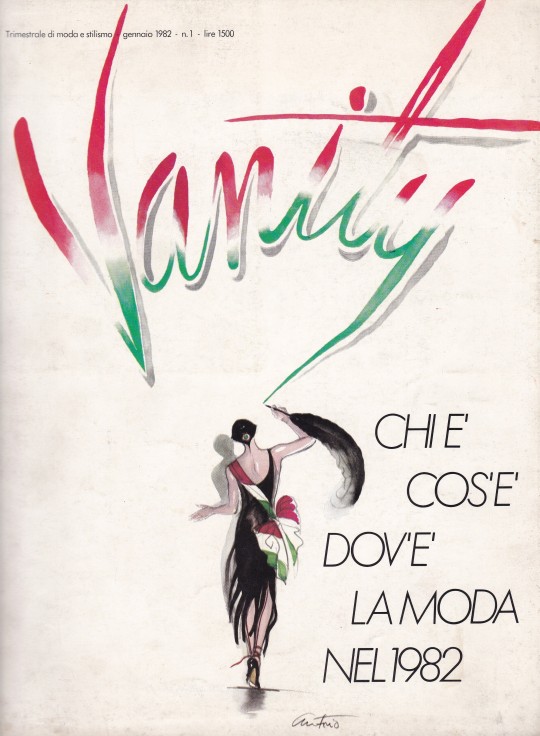

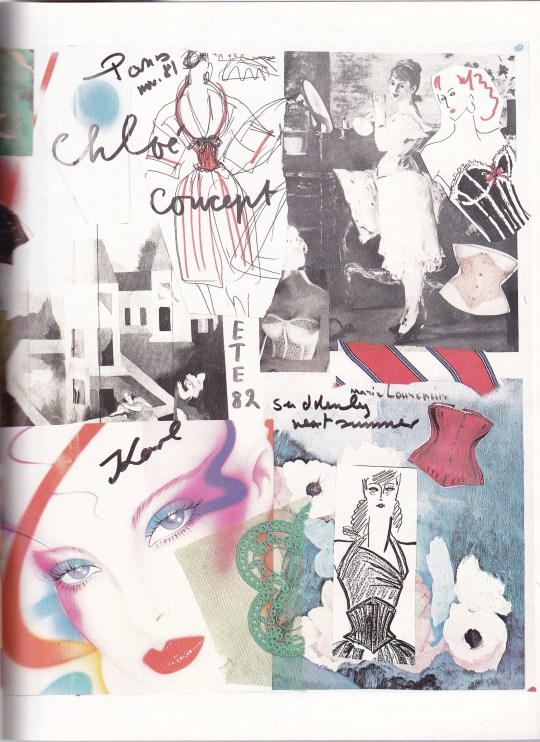
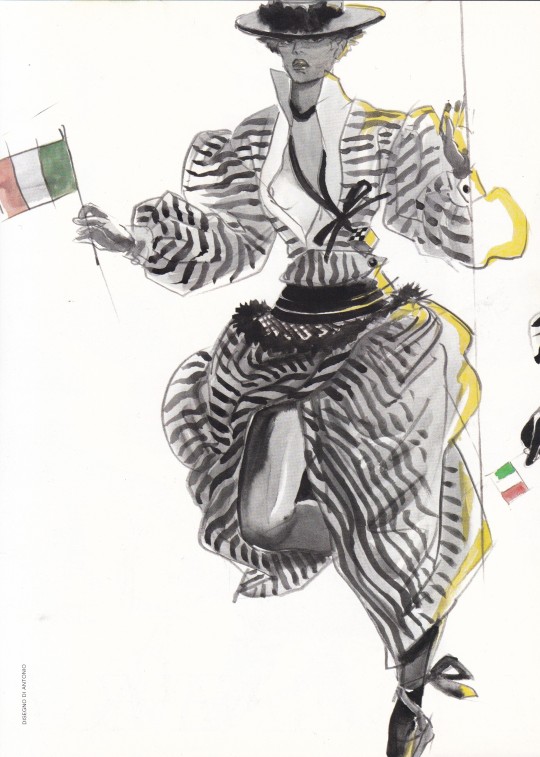

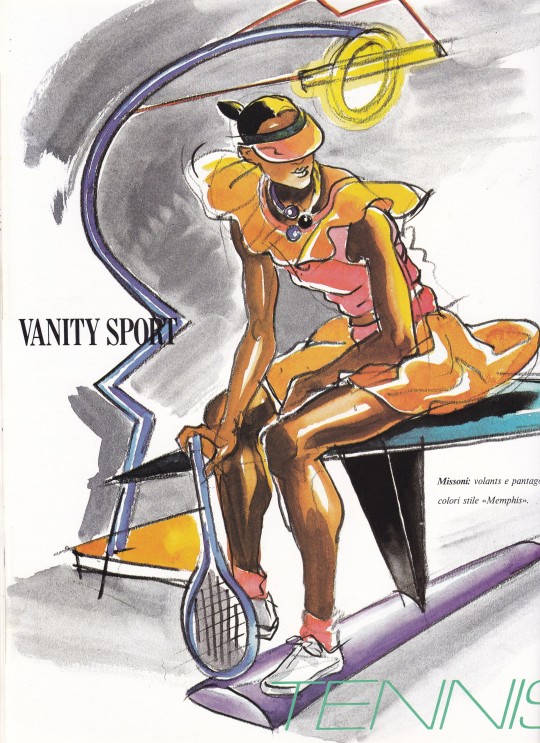
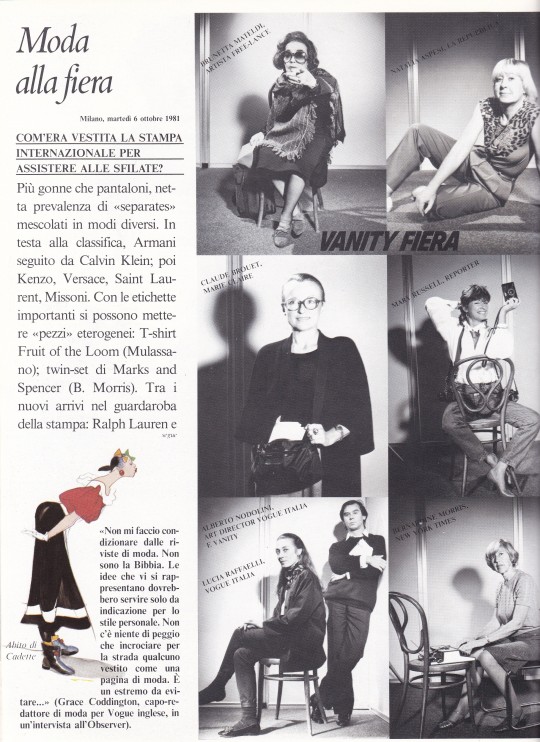
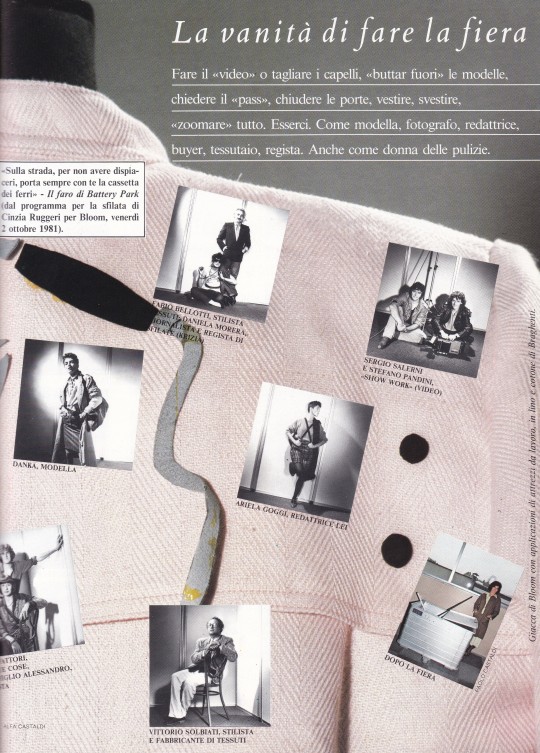
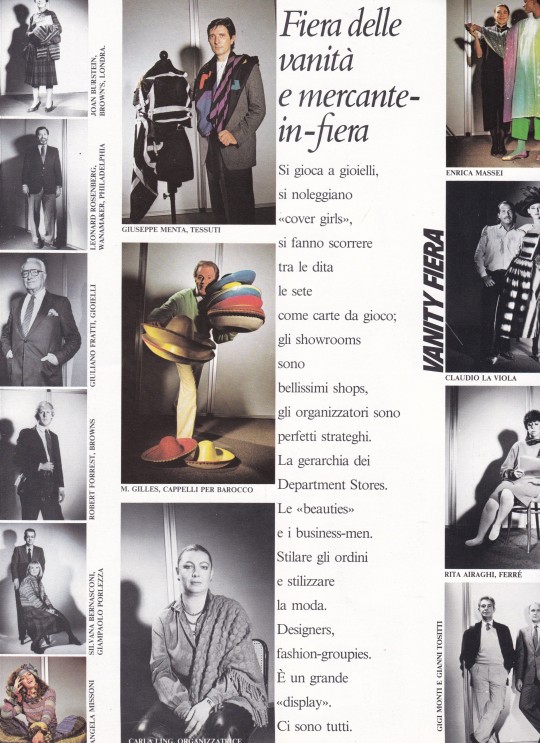

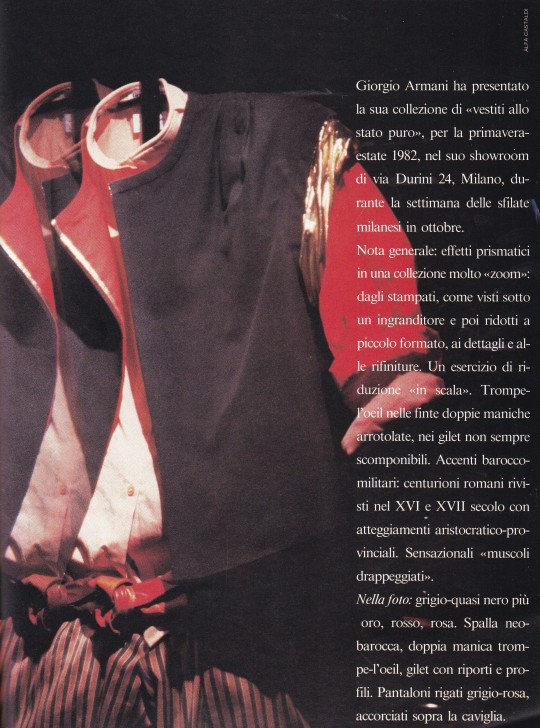
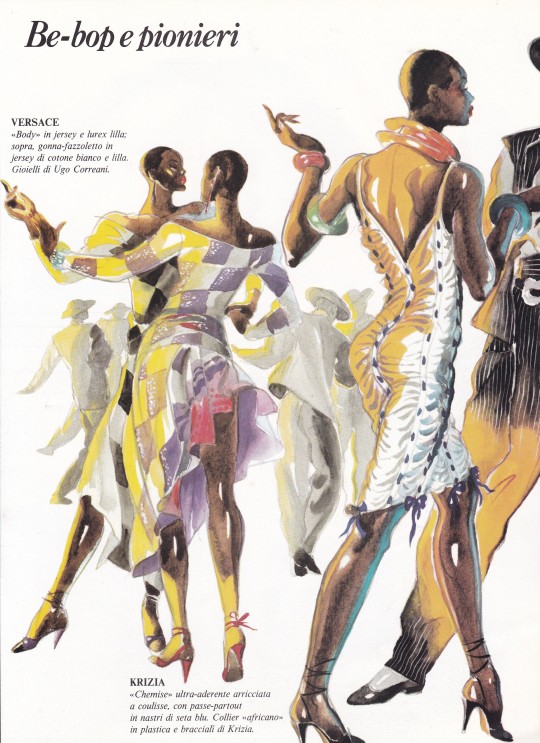
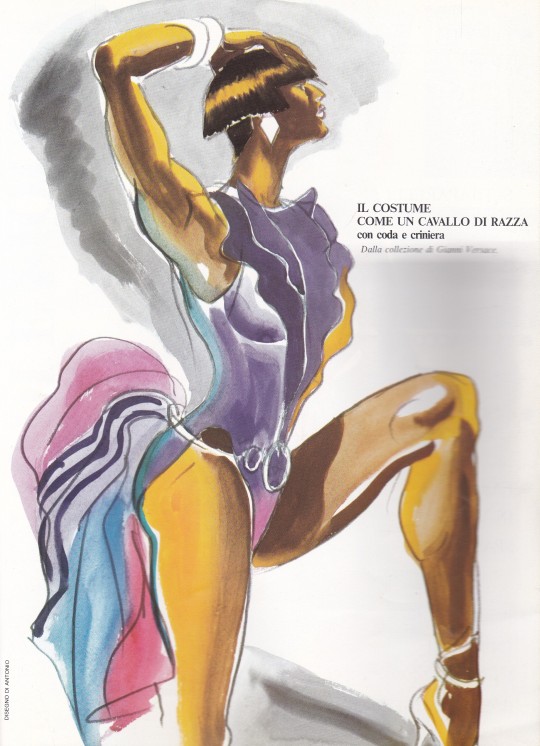
Vanity Numero 1 Gennaio 1982
Trimestrale di moda e stilismo
Progetto e realizzazione di Anna Piaggi
Edizioni Condé Nast, Milano 1982, 76 pagine, 23 x 29,5 cm
euro 240,00
email if you want to buy [email protected]
Direttore responsabile Franco Sartori
Direttore artistico Alberto Nodolini
Impaginazione Sam Rey, Antonella Sacchetto
Ricerche di moda Vern Lambert
redazione Emma Treves, Ornella Vallini

Quando nel 1962, trentunenne, Anna Piaggi sposa a New York il fotografo Alfa Castaldi, la sua carriera è in piena maturazione. Lavora come traduttrice per Mondadori e si avvicina alla moda un po’ per comunione d’intenti con il suo giovane sposo, un po’ perché ama scrivere e soprattutto leggere la società e le sue contraddizioni; la sua penna piace alle pagine mondane, collabora con L’Espresso e con Panorama. Quando a Londra, nel 1967, si imbatte nella bancarella di abiti di seconda mano e archivio di Vern Lambert, le si spalancano le porte verso il futuro del personaggio che sarebbe diventata. Con lui, collezionista e storico, stringe un’amicizia indissolubile, e impara a riconoscere il valore della couture. Dagli abiti del passato capisce la forza pervasiva della tradizione, del fatto a mano, del sartoriale, della modellistica, che sostengono il guizzo delle nuove intuizioni; mischiarli a quelli del suo tempo diventa naturale, come riportarli in vita per dimostrare a se stessa e chi ormai la fotografa in ogni occasione, che quando in un capo o in un accessorio c’è l’impronta del genio, il momento di indossarlo è oltre le epoche o le stagioni. Diventa maestra e regina di styling, inventando esotismi ed esagerazioni difficilmente replicabili. La chiama Vogue, dandole una rubrica nel 1988, le Doppie Pagine, su cui si è formato molto del giornalismo di settore contemporaneo; era sovversiva, irriverente, inquisitoria. Poco prima aveva fondato il suo magazine Vanity, tra le più interessanti avventure editoriali del periodo, dove gli illustratori e i talenti emergenti della fotografia erano di casa.
16/07/23
orders to: [email protected]
ordini a: [email protected]
twitter:@fashionbooksmi
instagram: fashionbooksmilano
designbooksmilano
tumblr: fashionbooksmilano
designbooksmilano
#Vanity Numero 1 Gennaio 1982#Vanity#Anna Piaggi#Antonio Lopez#Vern Lambert#Chloé#Karl Lagerfeld#Gianfranco Ferré#Valentino#Giorgio Armani#Walter Albini#Sam Rey#Missoni#Brunetta#Natalia Aspesi#Vittorio Solbiati#Fabio Bellotti#Giuseppe Menta#Krizia#Gianni Versace#fashion history#fashion magazine#Edizioni Condé Nast#fashionbooksmilano
22 notes
·
View notes
Text
La nostra voce è la nostra difesa: un viaggio poetico dal campo profughi alla speranza
Un libro che unisce voci e speranze, tradotto e raccontato da Angela Kosta
Un libro che unisce voci e speranze, tradotto e raccontato da Angela Kosta Quando si tiene tra le mani il libro La nostra voce è la nostra difesa, non si tratta solo di leggere poesie: è un viaggio nelle emozioni, nei dolori e nei sogni di giovani autori che vivono in condizioni estreme nei campi profughi del Malawi. Grazie alla traduzione e all’impegno di Angela Kosta, questa raccolta è molto…
#Africa#Alessandria today#Angela Kosta#Angela Kosta traduttrice.#AYAP#campo profughi Malawi#Charles Lipanda Mahigwe#Creatività#Critica letteraria#Cultura#cultura globale#Emozioni#empowerment#Futuro#giovani autori emergenti#giovani poeti#gioventù#Google News#Inclusione#italianewsmedia.com#Letteratura africana#Letteratura sociale#Lettura#Libertà#Pace#Pier Carlo Lava#Poesia#POESIA BILINGUE#poesia contemporanea#poesia e società
0 notes